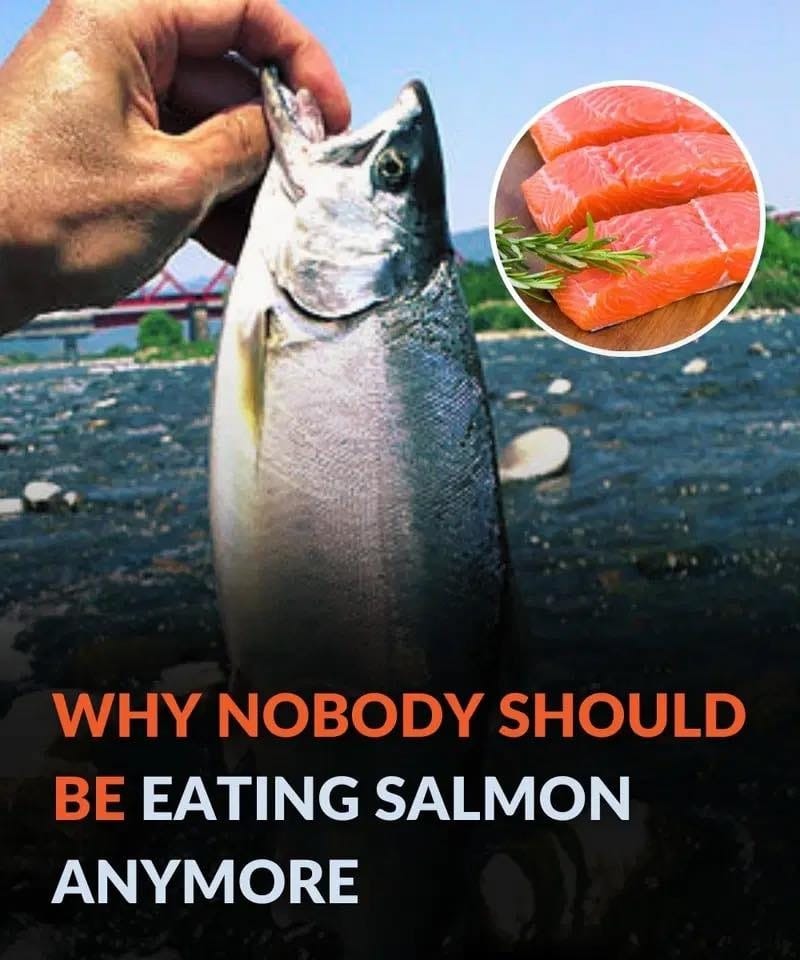ADVERTISEMENT
**Still Eating Salmon? You Might Want to Think Twice: A Comprehensive Look at the Risks and Benefits**
Salmon has long been celebrated as a superfood, touted for its heart-healthy omega-3 fatty acids, protein content, and overall nutritional benefits. It’s a staple in many diets, recommended by nutritionists and health experts worldwide. From sushi to baked fillets, this fish is a favorite for people looking to improve their health or simply enjoy a tasty, nutrient-packed meal.
However, as with any widely consumed food, there are emerging concerns and potential risks associated with the consumption of salmon, especially in today’s industrialized food system. Over the years, debates have arisen about the sustainability, environmental impact, and health risks associated with eating salmon. With such a range of opinions and data, it’s important to take a step back and reexamine whether this popular fish is as good for us as we’ve been led to believe.
In this article, we’ll explore both the benefits and the potential downsides of eating salmon, helping you make a well-informed decision about whether this fish should remain a regular part of your diet.
### **The Benefits of Eating Salmon**
Before delving into the concerns surrounding salmon, it’s important to first acknowledge the legitimate health benefits it offers. These benefits have made salmon one of the go-to fish for nutrition-conscious individuals.
#### 1. **Rich Source of Omega-3 Fatty Acids**
One of the primary reasons people eat salmon is its high omega-3 content. Omega-3 fatty acids are essential fats that our bodies cannot produce on their own, meaning we need to get them from our diet. Omega-3s play a critical role in reducing inflammation, lowering blood pressure, improving heart health, and supporting brain function.
Salmon, particularly wild-caught salmon, is one of the richest natural sources of these beneficial fats. It contains both **EPA** (eicosapentaenoic acid) and **DHA** (docosahexaenoic acid), two types of omega-3s that have been linked to a wide variety of health benefits. Studies have shown that omega-3 fatty acids can reduce the risk of cardiovascular disease, lower triglyceride levels, and improve cognitive function in aging adults.
#### 2. **High-Quality Protein Source**
Salmon is an excellent source of high-quality protein, essential for muscle growth, repair, and overall body function. A single serving of salmon can provide upwards of 20 grams of protein, making it a fantastic choice for anyone looking to meet their daily protein requirements. Protein is also essential for maintaining healthy skin, hair, and nails, and it plays a key role in immune function.
For those who follow a low-carb or ketogenic diet, salmon can be an ideal protein source due to its combination of healthy fats and high protein content.
#### 3. **Packed with Vitamins and Minerals**
In addition to omega-3s and protein, salmon is also packed with essential vitamins and minerals. A typical serving of salmon provides a good amount of **Vitamin B12**, which is important for energy production, red blood cell formation, and maintaining a healthy nervous system. It also contains **Vitamin D**, which is crucial for bone health and immune function. Salmon is also a source of **selenium**, **potassium**, and **B vitamins**, all of which contribute to overall health.
#### 4. **Brain Health and Cognitive Function**
Salmon is often recommended for its benefits to brain health. The omega-3s found in salmon are important for cognitive function and mental health. DHA, in particular, is a major structural fat in the brain and plays a vital role in maintaining brain cell structure and function. Regular consumption of omega-3-rich fish like salmon has been linked to improved memory, mood stabilization, and reduced risk of cognitive decline, particularly in older adults.
5. **Improved Skin Health**
The high levels of omega-3 fatty acids in salmon can also contribute to healthier skin. Omega-3s help reduce inflammation, which can alleviate conditions such as acne and eczema. Additionally, the fat content in salmon helps keep the skin moisturized and prevents it from becoming dry or flaky.
For Complete Cooking STEPS Please Head On Over To Next Page Or Open button (>) and don’t forget to SHARE with your Facebook friends
